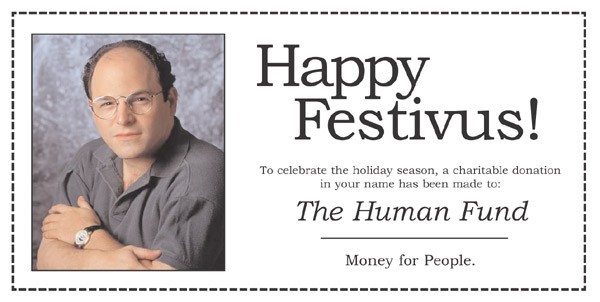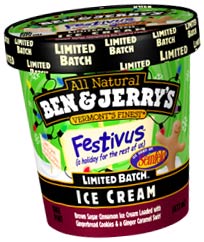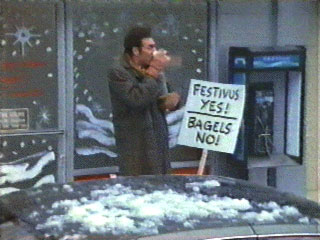|
|
|||||||||||||||||||||||||||||||
|
A Festivus for the Rest of Us!
The Genesis of FestivusAccording to a 2005 New York Times poll, approximately 3% of Americans now celebrate Festivus. Festivus is an annual holiday invented by Reader's Digest writer and editor Daniel O'Keefe. The English word festive derives from the Latin word festivitas meaning "holiday", and the related word festus meaning "feast". The O'Keefe tradition did not have a set date, but would take place in response to family tension, "any time from December to May". However the original holiday took place in the "Past" day before the presentation of presents which fostered altruism in the community when supplies were diminished, and the "Future" which represented the hope of the coming year. The phrase "a Festivus for the rest of us" also derived from an O'Keefe family event, the death of the elder O'Keefe's mother.
The elder O'Keefe wrote a book that deals with idiosyncratic ritual and its social significance, a theme with great relevance to Festivus tradition. It was introduced to popular culture by O'Keefe's son Daniel, a scriptwriter for the TV show Seinfeld, on December 18, 1997, in the episode "The Strike". The holiday is celebrated each year on December 23, but many people celebrate it at other times, often to avoid the Christmas rush. The holiday includes novel practices such as the "Airing of Grievances", in which each person tells everyone else all the ways they've disappointed him/her over the past year. Also, after the Festivus meal, the "Feats of Strength" are performed, involving wrestling the head of the household to the floor, the holiday only ending if the head of the household is actually pinned. Some people, influenced or inspired by Seinfeld, now celebrate the holiday, in varying degrees of seriousness; some carefully following rules from the TV show or books, others humorously inventing their own versions.
Frank Costanza: Many Christmases ago, I went to buy a doll for my son. I reached for the last one they had, but so did another man. As I rained blows upon him, I realized there had to be another way. Cosmo Kramer: What happened to the doll? Frank Costanza: It was destroyed. But out of that a new holiday was born: a Festivus for the rest of us! Cosmo Kramer: Is there a tree? Frank Costanza: No, instead, there's a pole. It requires no decoration. I find tinsel distracting. Frank Costanza: It's made from aluminum. Very high strength-to-weight ratio. Mr. Kruger: I find your belief system fascinating. Frank Costanza: And at the Festivus dinner, you gather your family around, and tell them all the ways they have disappointed you over the past year! Frank Costanza: I got a lot of problems with you people! And now, you're gonna hear about it. You, Kruger. My son tells me your company STINKS!
George Costanza: Oh, God. "In Festivus: The Holiday for the Rest of Us" by Allen Salkin, drinking is encouraged with hearty beer, rum, bourbon, or wine. In the episode, no alcohol was served, but George Costanza's boss, Mr. Kruger, drank from a flask. The on-air meal appeared to be meat loaf or spaghetti in a red sauce.
Strange PopularityFestivus, the fictional Yule-time holiday created by Frank Costanza, George's dad, in one memorable episode of Seinfeld. Created in protest against the prevailing sentiments of the season, Festivus celebrations included such heartwarming family rites as "feats of strength" and "airing of grievances." For most of its celebrants, particularly George, Festivus was downright embarrassing, if not humiliating.
But the idea of Festivus is becoming popular. Its like a new name for the ol' Yuletide tradition (a pre-Christian gathering with friends/family for 12 days during December and exchanging gifts). Except Festivus isn't 12 days long. Its one. And for some families this alternative non-Christian way of celebrating the holiday season is becoming the standard. Minus the "feats of strength" and the "airing of grievances", of course. Festivus, essentially an atheist holiday, represents traditional values of family and friends. No Santa Claus, the Xmas tree is optional, and we don't lie to the children and fill them up with phoney stories.
Gift giving is a tradition all around the world this time of year, regardless of most religions. Not all celebrate, but most do, in their own way. The celebration dates back to the widespread idea of Yuletide. The Yuletide is an ancient pagan religion (some believe to be part of the Norse religion) in which you bring a Yule log with you when you visit friends and family during the time of year when the first snowfall comes (usually in December). The log would be burnt over the fireplace, warming the hearth and home. Over time those logs got replaced with alcohol, food and gifts. Thus Yuletide gift-giving became a standard tradition all across Eurasia and as far south as parts of Africa.
Christmas, a drunken holiday originally held in March (and much prone to rioting), was later moved to December by a Roman Emperor. The combination of Yuletide and Christmas resulted in Christmas gift-giving, essentially two beliefs that combined, and the loss of the drinking/rioting that previously had plagued Christmas celebrations. These days few people celebrate the 12 days of Yuletide (indeed, its now commonly referred to as the "12 days of Xmas"), but the idea of Festivus from the popular Seinfeld episode really isn't a bad idea. The "feats of strength" and the "airing of grievances" are definitely bad ideas, but overall Festivus is an excellent way to spend time with friends and family.

Fun Festivus Trivia

|
|
||||||||||||||||||||||||||||||
|
Website Design + SEO by designSEO.ca ~ Owned + Edited by Suzanne MacNevin | |||||||||||||||||||||||||||||||



